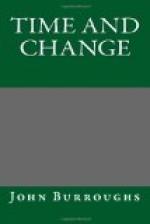There must have been a time when life was not upon the earth and there must again come a time when it will not be. It has probably vanished from the moon and all inferior planets, and it has not yet come to the superior planets, except maybe to Mars. It must be and must have always been potential in matter, but this fact leaves the mystery as profound as ever.
Yet if the artificial production of life were to happen to-day—if in some of our laboratories living matter were produced from non-living, should we not still have to credit the event to some mysterious potency residing in matter itself? If by a lucky stroke man were to evoke the organic from the inorganic, be assured he would not evoke something from nothing, or add anything to the latent possibilities of the elements with which he works. Does not the question still remain who or what made this feat possible? One dare affirm that man cannot create life de novo any more than he can create matter. He may yet evoke life as he evokes the spark from the flint and the flame from the match or as he evokes force from the food he eats. In this latter case he does not create the force; he liberates it through the vital forces of his body. The spark from the flint and the flame from the match were called forth by a mechanical process, but the process was set going by the will which waits upon the vital process. The body with all its many functions is a complicated system of mechanical devices and chemical processes, but that which is back of all and governs all is not mechanical; the body is a machine plus something else.
The chemist or biologist who shall produce a speck of protoplasm to-day will have the credit of unlocking a power in inorganic nature; he will prove by a short cut how immanent the creative energy or the vital force of the universe is in matter. He will not have eliminated the creative energy; he will only have disclosed it and availed himself of it.
We behold spontaneous combustion, a fire self-kindled, but we do not see the activity of the particles of matter that preceded it or penetrate the secret of their mysterious affinities. The fire was potential there in the very constitution of the elements. We flout at miracles, and then we disclose an unending miracle in the life about us.




